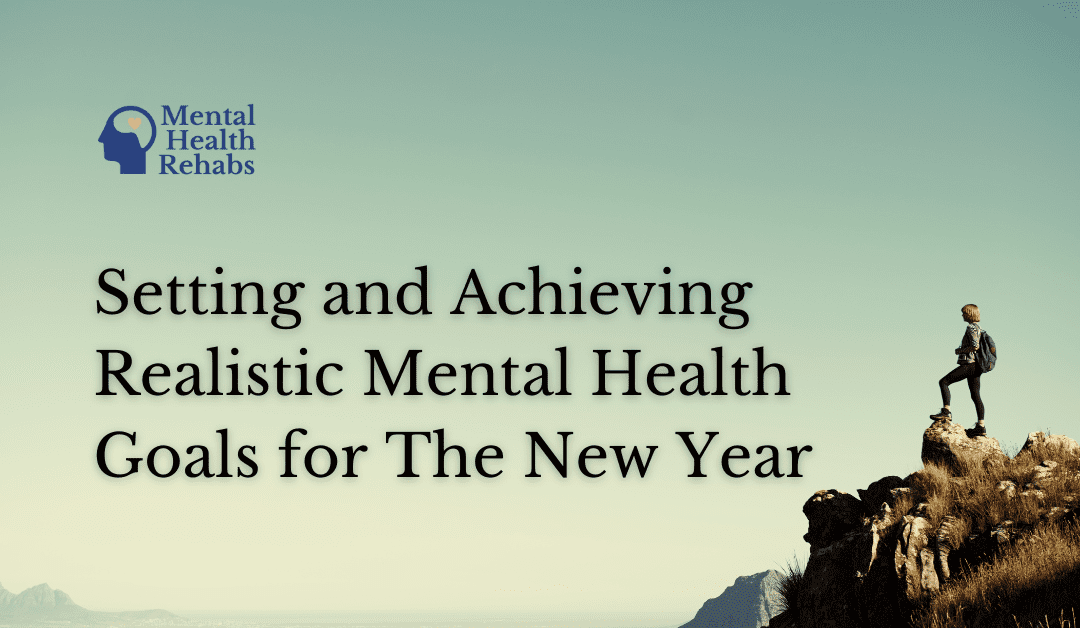The Holiday season ends, and now it’s time to shift our attention toward ourselves. Particularly to our mental health. While adding a desired job, a new skill, or a travel adventure to your New Year’s resolution list is worth it, it’s equally important to prioritize your mental well-being. That’s why you may consider including mental health goals in your New Year’s resolutions.
But how can we establish goals that align with our lifestyle and are realistic enough to attain? It may sound challenging, but you can set yourself up for success in the new year in the right direction.
How to Set Realistic Mental Health Goals
Realistic mental health goals typically focus on achievable, specific, and measurable objectives. Simply thinking about what we want to achieve is just the initial step. The real work lies in grounding ourselves and assessing, balancing, and tracking our progress toward those goals.
Here are some steps on how you can carefully set your goals:
1. Assess Your Current Circumstances. Consider your time commitments, available resources, and responsibilities. Evaluate your current mental health status and identify areas of improvement or challenges.
2. Evaluate Relevance. Tailor your goals to prioritize the areas of your mental health that require the most attention and care.
3. Set Realistic Expectations. Once you assess your circumstances, find a balance between what you are capable of and what you can realistically achieve.
4. Define Measurable Goals. Break down big goals into smaller tasks, then set specific metrics or numerical targets that allow you to measure progress objectively.
5. Ensure Achievability. Ensure that each step or action to reach each goal aligns with your capabilities and resources.
6. Establish Time-Bound Objectives. Set clear deadlines or timeframes for accomplishing your goals.
7. Maintain Flexibility. Recognize that circumstances may change and be open to adapting your goals and strategies as needed.
10 Common Mental Health Goals for the New Year
If you already know you want to improve your mental health this new year but are unsure where to start, help yourself with this list of the ten most common mental health goals:
- Invest more time in understanding your thoughts, emotions, and behaviors better. This will give you insight into your triggers, patterns, and coping strategies.
- Dedicate regular time to practice mindfulness, engaging in hobbies, or taking relaxing breaks.
- Make sleep a priority by setting consistent bedtimes and wake-up times and creating a comfortable sleep environment.
- Set boundaries and consciously limit your screen time.
- Recognize the need for professional help and commit to therapy sessions or recovery programs for guidance, support, and tools for your mental health journey.
- Learn to assertively say “Yes” and “No” when it aligns with your well-being and priorities.
- Surround yourself with individuals who uplift and support your mental health goals.
- Foster relationships that encourage open communication, empathy, and understanding.
- Let go of grudges and practice forgiveness towards others and yourself.
- Educate yourself on mental health topics that empower you to make informed decisions.
What Happens When There’s a Setback?
Just like life itself, any journey toward achieving goals is a rollercoaster. There’s ups and downs. Yes, setbacks can be disheartening and lead to frustration or self-doubt. However, try to perceive them as opportunities for growth and learning rather than reasons to give up.
When facing a setback when trying to reach your goal, try to practice self-compassion with yourself. Take some time to reflect on what might have contributed to the setback, reassess your approach and get ready to get back on track.
Remember, setbacks are not final or definitive failures but rather part of the learning and growth process. How you respond to them can define your journey and success in the long run.
How to Monitor Your Progress During the Year
Monitoring the progress of your New Year’s mental health goals is easier than you think. Doing it will help you stay accountable and stay on track. Here are some strategies to help you monitor your progress effectively:
- Set Clear Milestones. Breaking down your big goals into smaller milestones will help you during the year, as they work as checkpoints along your journey. This tracking will help you stay focused and motivated.
- Schedule Regular Check-ins. Set aside time for regular check-ins with yourself and reflect on your achievements, challenges, and any adjustments needed. Evaluate your actions, make necessary changes, and stay accountable to your goals.
- Keep a Progress Journal. Maintaining a journal or digital log to record your thoughts, emotions, and experiences can provide valuable self-reflection and help you identify patterns or areas for improvement.
- Celebrate Successes. Reward yourself when you reach significant milestones or progress, no matter how small.
- Reflect on Setbacks. Take time to reflect on setbacks. Analyze the factors that contributed to them, identify lessons learned, and develop strategies to address and overcome challenges in the future.
- Schedule an Annual Review. Set a specific time each year to comprehensively review your mental health goals. Assess your overall progress, challenges, and lessons learned throughout the year.
Prioritizing Mental Health for the New Year
No matter how big or small your New Year’s resolutions are for 2024, including mental health goals in your list will make a long-term difference. This is an opportunity to get to know yourself better, understand your capabilities and limits, and learn how to navigate challenging situations.
As you embark on this journey, it’s important to remember that you don’t have to go it alone. You have a support network around you that you can lean on whenever you feel you need more motivation or support. Contact your friends, family, mentors, or a professional when you need guidance or a listening ear.
Remember that setbacks do not define your ability to achieve your goals. You can recover and progress toward improved mental health with resilience and perseverance.

